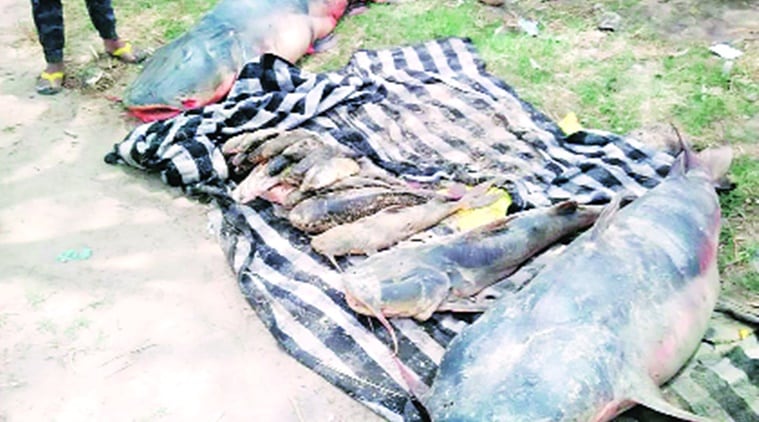 Spillage of molasses from a Sugar mill had caused an ecological disaster in Beas in 2018, killing the aquatic life. Archive
Spillage of molasses from a Sugar mill had caused an ecological disaster in Beas in 2018, killing the aquatic life. Archive
When it comes to proposals for industry on the bank of any water body, the Punjab Pollution Control Board (PPCB) has always had to navigate a tightrope walk to stand its ground amid immense pressure from various ends.
Back in 2012, the PPCB had refused to allowe the Guru Gobind Singh Oil Refinery in Bathinda to even touch the Lasara drain that flows at distance of around 20 km from it.
Aam Aadmi Party MLA from Mansa Nazar Singh Manshahia, who retired as a senior executive engineer from PPCB in 2015, was PPCB XEN at Bathinda at the time when the refinery wanted to discharge extra ‘treated water’ under extraordinary circumstances into the Lasara drain. However, the board was against this.
Manshahia had joined Congress during the 2019 parliamentary elections, but is technically still an AAP MLA.
“I was under political pressure to allow the refinery to have a pipeline connection with Lasara drain. But I didn’t bend and the refinery missed it by a few hundred metres. They had already laid a pipeline for around 20 km as part of the irrigation network. Refinery told us that it would only discharge treated water in Lasara drain that too under extraordinary circumstances. But it is always a risk to allow any industry to have a connection with any water channel. Because you can’t keep eyes on the industry 24 hours and such connections can be exploited at anytime,” said Manshahia.
“Lasara drain is one of the most polluted water channels in the state. There are many industries on the bank of Lasara drain, which would often discharge effluents in the drain in violation of norms. No industry can discharge any treated or untreated water outside its premises. It is the reason that you will find many industries on the bank of water channels and rivers because it is easy to illegally discharge effluents into water channels or rivers,” said the MLA.
When industries get their way: Molasses spillage into Beas in 2018
“I was under pressure to clear the file of a new distillery on the bank of Lasara drain in Bathinda district just one day ahead of voting day for 2012 Assembly elections. I refused to clear the file after site visit because its treatment tanks were just touching Lasara. But industry had its ways. It is still functioning there,” said Manshahia.
“I had also objected to the Chadda Sugar mill location near the Beas river in Kala Afghan. I had additional charge of Gurdaspur at that time in 2008. I had proposed to ask the sugar mill to deposit Rs 75 lakh bank guarantee in advance. But again there was pressure and the mill was asked to deposit negligible bank guarantee against the risk that it had created for the Beas. The nightmare came true in 2018,” said Manshahia.
Spillage of molasses from the same mill had caused an ecological disaster in Beas in 2018.
After this accident, in The Indian Express report published on May 26, 2018, then PPCB chairman Kahan Singh Pannu had said, “There is no policy of not permitting industries close to water bodies, but this episode will make way for such a policy. Such an accident has taken place for the first time. Regulatory bodies learn from such kind of accidents.and new protocols will be laid. All these things will have an impact on the PPCB policy.”
“I was proved right in 2018. Every officer in PPCB understands the problem with industry near a water body. But PPCB can’t stop it as there has been no guidelines or regulations against setting up of industry near the water channel or river. Government should make such guidelines, only then can PPCB reject such proposals which may be problematic in the long run,” said Manshahia.
PPCB had also installed CCTV cameras to keep an eye on the discharging point in some industries near water channels or rivers.
“Cameras can’t do much until PPCB authorities are free to act on the violation and your hands are not tied,” said Manshahia.
Contrary to the idea of the state government coming up with an industrial park near the Sutlej bank, the ‘National Mission for Clean Ganga’, under its ‘Namami Gange’ programme, has provided funds to state governments to establish nurseries and grow trees, plants and shrubs as suited to climate and soil to keep the Ganga clean and recharged.
Despite lockdown, Sutlej still Punjab’s most polluted river
The Sutlej is already the most polluted river of Punjab and PPCB had noted that its water has shown little improvement even during the lockdown period, when all natural water bodies become nearly free of pollution.